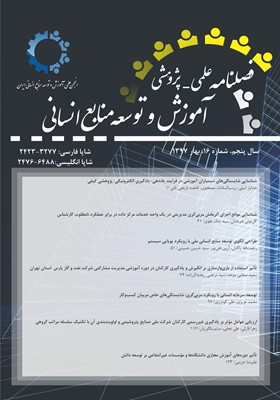ارزیابی عوامل مؤثر بر یادگیری غیررسمی کارکنان شرکت ملی صنایع پتروشیمی و اولویتبندی آن با تکنیک سلسله مراتب گروهی
محورهای موضوعی :زهرا قارلی 1 * , علی نجفی 2 , میثم بلگوریان 3
1 - دانشگاه علامه طباطبایی
2 - دانشگاه علامه طباطبایی
3 - دانشگاه خوارزمی
کلید واژه: یادگیری غیررسمی, عوامل مؤثر بر یادگیری, روش سلسله مراتبی گروهی (AHP).,
چکیده مقاله :
این مقاله به بررسی و ارزیابی عوامل مؤثر بر یادگیری غیر رسمی کارکنان شرکت ملی صنایع پتروشیمی و در نهایت اولویتبندی آنها با استفاده از تکنیک سلسله مراتبی گروهی پرداخته است. روش این پژوهش ارزشیابی میباشد. جامعه آماری این پژوهش،336 نفر از کارکنان رسمی است که حجم نمونه با استفاده از جدول مورگان 181 نفر به روش نمونه گیری تصادفی ساده برآورد گردید. تعداد 143 پرسشنامه بازگشت دادهشده، قابل بررسی بودهاست. ابزار گردآوری دادهها شامل دو پرسشنامه مجزا، پرسشنامه عوامل مؤثر بر یادگیری غیررسمی با 30 گویه وپرسشنامه مقایسات زوجی با 7 عامل میباشد نتایج حاصل از آزمون آماری t تک نمونهای نشانداد عوامل فرهنگی، هنجارها و ارزشهای اجتماعی، نوع صنعت، انگیزشی، فردی در وضعیت مطلوبی قرار دارد. ولی مؤلفههای سبک رهبری و سازمانی در وضعیت مطلوبی قرار ندارد. در نهایت نتایج حاصل از بهکارگیری تکنیک فرایند سلسله مراتب گروهی نشان داد رهبری، فرهنگی، سازمانی، فردی، انگیزش، ارزشها و هنجارهای اجتماعی و نوع صنعت به ترتیب در اولویت اول تا هفتم قرار دارد.
This article examined and also ranked effective factors on informal learning of employees in National Iran Petrochemical Company using AHP. Research method is evaluation. Using a simple random sampling method, we select a sample of 181 employees out of 336 employees in National Iran Petrochemical Company using Morgan table. Out of 181 questionnaires 143 ones returned. In order to gather data two separated questionnaires for measuring important factors of informal learning with 30 questions and pair comparison with 7 factors were used. Results of T tests showed that cultural, norms social values, industry type, motivation and personal factors are in good positions. This is while leadership style and organizational components are not in a good status. Finally using Analytic Hierarchy Process, our results show that leadership, cultural, organizational, personal, motivation and values, social norms and industry type respectively are the most important factors in the informal learning.
1. Afzalnia M R, Eshkoh H, Kolavi A. Examining the position of formal, informal and eternal learning in unstable age of iformation. Journal of engineering education. 1389; 12(45).
2. Noorozian M. M, Afzan N F, Akma A S. The Moderating Effects of Motivation on Work Environment and Training Transfer: A Preliminary Analysis. Procedia Economics and Finance. 2016; 37, 158-163.
3. Ghanbari S, Shams morekani Gh, Arefi M, Zandi Kh. Pathology of knowledge transferring to work environment in public organization in Kordestan Province. Journal of education and human resource development. 1396; 4 (12).
4. Eskandari H. Knowledge and learning.1392. Avaye noor Publication.
5. Rogoff B. Learning by Observing and Pitching-In Overview. 2014. Retrieved 22.
6. Conlon TJ. A review of informal learning literature, theory, and implications for practice in developing global professional competence, Journal of European Industrial Training. 2004; 28 (2-4).
7. Galanis N, Enric M, Alier M, García F. 2009. Educational training. Dover publication.
8. Conner M L. Informal learning.2005; Available in http:ageless learner.com/ intros / informal.html.
9. Ayeenesaz H. Designing informal learning pattern for entrepreneurs. Dissertation. 1389; University of Tehran.
10. Seif A. Educational Phycology. 1390.Tehran: Dooran Publication.
11. Eraut M. Informal learning in the workplace: Studies in Continuing Education. 26(2): 247-273.
12. Shi J, Liu X. Empirical Study of Factors Affecting Training Transfer of Grassroots Employees in Petroleum Enterprises.Open Petroleum Engineering Journal, 2015;8: 368-372.
13. Cornell P. The growth of informal learning environments.2008; Available in: http: ageless learner.com/ intros / informal.html.
14. Shabastari B. Fifty years of Radio Effort for providing informal learning. Mashhad. 1387.
15. Razavi S A, Rahimi Doost Gh. The role of media in informal learning- life skills from viewpoint of chamran university students. Mashhad. 1387.
16. Aminoroaya S, Ahmadi Gh, Nadi M. Examining the relationship between components of learning organization with informal learning in senior high school of Isfahan city. Journal of leasership and educational management. 1388; 3(4).
17. Zeraatkar Ahmad. Identification of informal learning methods for managers. Journal of organizational culture management. 1395; 41(2).
18. Berg S A, Chyung S Y. Factors that influence informal learning in the workplace. Journal of workplace learning.2008; 20(4): 229-244.
19. Talja S. The role of formal and informal learning. Journal of workplacelearning. 2007; 19:469-481.
20. Lohman M C, Woolf N H. Self-initiated learning activities of experienced public-school teachers: methods, sources, and relevant organizational influences. Teachers and Teaching: Theory and Practice. 2001; 71: 61-76.
21. Lohman M C. Environmental inhibitors to informal learning in the workplace: a case study of public-school teachers. Adult Education Quarterly. 2000; 50 (2) 83-101.
22. Lohman, M C. Work situations triggering participation in informal learning in the workplace: a case study of public-school teachers. Performance Improvement Quarterly. 2003; 16(1). 40-54.
23. Boekaerts M, Minnaert A. Self-regulation with respect to informal learning. Leiden University. 2001.
24. Ellinger A D. Contextual factors influencing informal learning in a workplace setting: The case of reinventing itself company" Human Resource Development Quarterly.2005; 27.
25. Doornbos A, Bolhuis S, Denessen E. Exploring the relation between work domains and work-related learning: The case of the Dutch police force International Journal of Training and Development.2004; 8(3): 74-90.
26. Marsick V J, Watkins K E. Informal and incidental learning, New Directions for Adult and Continuing Education. 2001; 89: 25-34.
27. Van Oerkom M, Nieuwenhuis L. Critical reflective working Behavior: A survey research.2002.
28. van Veelen R, Sleegers P J, Endedijk Maaike. Professional Learning Among School Leaders in Secondary Education: The Impact of Personal and Work Context Factors, jornal of Educational Administration Quarterly.2017; 53: 365-408.

